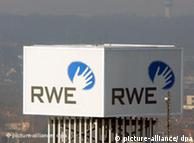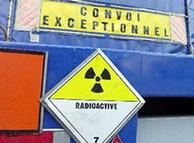Plans for several
new nuclear facilities are currently in the works in the United Kingdom.
But according to a recent study, the British government will have to
reform the country's electricity market and make investment in nuclear
power attractive if the plans are going to become reality.
The report published
this week by British auditing and consulting company KPMG, which
detailed the nuclear industry's ability to secure private investments,
was commissioned by German utility giant RWE power.
RWE is set to partner with fellow utility E.ON to build new nuclear power stations in the United Kingdom.
Since nuclear energy
does not emit carbon dioxide, the study argued it should be placed on a
level playing field with low-emissions, renewable energy sources, such
as wind and solar power, and play a key role in the British government's
climate goals.
Over the next 10 years, Britain aims to cut greenhouse gas emissions to 34 percent below 1990 levels.
"In order to meet
those targets, our view is that they will almost certainly need nuclear
power," Jamie Carstairs, KPMG director in corporate finance and one of
the report's authors, told Deutsche Welle.
A sound investment?
 Bildunterschrift: Großansicht des Bildes mit der Bildunterschrift: The British government has refused public subsidies for the nuclear industry
Bildunterschrift: Großansicht des Bildes mit der Bildunterschrift: The British government has refused public subsidies for the nuclear industry
The report encouraged
the government to adopt more consistent policies to reward low-carbon
energies - including the establishment of a single market for
low-emissions sources of electricity or several markets for different
energy technologies.
"We think that under
the current framework, it's unlikely that we will get a large amount of
investment in new nuclear generation in the UK," Carstairs said, adding
that the electricity market should reward low-carbon generation.
Unlike other
technologies, pumping money into nuclear power ventures requires
patience on the part of private investors. According to the report, it
can take three decades or longer to cover project costs.
"Establishing
confidence, if not certainty against this backdrop is likely to be
critical to the investment decision," the study read.
Pushing for policy reform
 Bildunterschrift: Großansicht des Bildes mit der Bildunterschrift: German utilities RWE and E.ON plan to build two new nuclear plants in the UK
Bildunterschrift: Großansicht des Bildes mit der Bildunterschrift: German utilities RWE and E.ON plan to build two new nuclear plants in the UK
A spokesman for
Britain's Department of Energy and Climate Change (DECC) told Deutsche
Welle that the government is well aware of the need for changes in the
electricity market to "deliver security of supply and investment in
low-carbon energy."
But the UK's
leadership has stopped short of offering public subsidies to support
nuclear power projects - as it does with some forms of renewable energy.
"The government is
committed to removing any unnecessary obstacles and allowing the
construction of new nuclear power stations to contribute to our energy
security and climate change goals - provided that they receive no public
subsidy," the DECC spokesman said, echoing remarks made by the
Secretary of State for Energy and Climate Change Chris Huhne during a
parliamentary debate at the beginning of July.
But the UK government
was pursuing a reform of the carbon floor price that would reward
companies that invest in nuclear and renewable energy technologies, the
spokesman said.
"The challenge will be
to ensure that these measures work together to deliver a coherent
framework to give confidence to investors," he said.
KPMG's report welcomed
the carbon floor price but said research indicated that the measure was
considered "insufficient" to boost investment in nuclear projects.
'Slippery slope'
 Bildunterschrift: Großansicht des Bildes mit der Bildunterschrift: Critics argue that the cost of nuclear waste disposal must be factored in
Bildunterschrift: Großansicht des Bildes mit der Bildunterschrift: Critics argue that the cost of nuclear waste disposal must be factored in
Critics have said
simply covering the initial investment in nuclear energy ventures would
require a very high carbon price - and could weaken efforts to build a
green economy:
"Spending is going to
be skewed away from the clean energy solutions that we need to be
funding," Ben Ayliffe, senior climate campaigner for Greenpeace UK, told
Deutsche Welle.
KPMG's study
acknowledged that nuclear projects often exceed initial budget
projections and fall behind schedule. But Ayliff said the mammoth
uncertainties over nuclear waste disposal must also be accounted for.
"The bottom line is
that the economics of new nuclear, despite the rhetoric of the industry,
are as bad as they've ever been," he said.
Investment in nuclear
energy doesn't make economic sense, he added, calling a carbon floor
price a "slippery slope" that could well lead to other measures that
support the nuclear power industry to the detriment of green power
sources.
"The historic support
for nuclear power has been astronomical in this country, and the
industry just hasn't matured," he said. "They can't stand on their own
two feet."
According to the DECC,
British energy minister Chris Huhne is scheduled to address the
government's reform priorities in parliament next week as part of the
annual statement on energy.
Author: Amanda Price
Editor: Sean Sinico
http://www.dw-world.de/dw/article/0,,5823274,00.html









